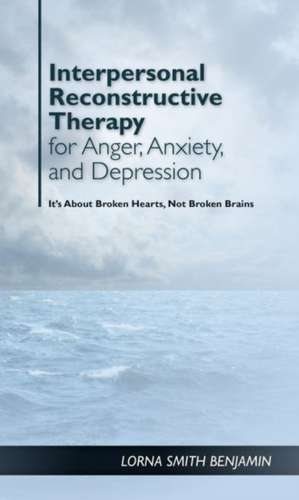Interpersonal Reconstructive Therapy for Anger, – It`s About Broken Hearts, Not Broken Brains
Autor Lorna Smith Benjaminen Limba Engleză Hardback – 7 mai 2018
According to IRT theory, patients who suffer from maladaptive anger, anxiety, or depression are reenacting dysfunctional lessons in affect management modeled by parents and other early attachment figures. For example, a depressed woman who is afraid to assert herself can be described as reliving a childhood during which speaking up was dangerous, leading to rejection, even abandonment. IRT gives sufferers the tools to revise or replace internalized versions of attachment figures (the "family in the head") to create a more secure internal base.
IRT is integrative, drawing on any intervention relevant to the case formulation, and it is compatible with medications as needed for stress management. Evidence of effectiveness is provided for a treatment-resistant population. In this warm and engaging book, author Lorna Smith Benjamin shows how patients can more effectively cope with threat and find safety in their everyday lives.
Preț: 546.22 lei
Preț vechi: 709.38 lei
-23% Nou
Puncte Express: 819
Preț estimativ în valută:
104.52€ • 111.77$ • 87.15£
104.52€ • 111.77$ • 87.15£
Carte indisponibilă temporar
Doresc să fiu notificat când acest titlu va fi disponibil:
Se trimite...
Preluare comenzi: 021 569.72.76
Specificații
ISBN-13: 9781433828904
ISBN-10: 1433828901
Pagini: 316
Dimensiuni: 190 x 257 x 21 mm
Greutate: 0.74 kg
Editura: Wiley
ISBN-10: 1433828901
Pagini: 316
Dimensiuni: 190 x 257 x 21 mm
Greutate: 0.74 kg
Editura: Wiley
Cuprins
Preface
Chapter 1. Introduction and Overview
Part I. Foundational Concepts
Chapter 2. Natural Biology: Mechanisms of Psychopathology and Change
Chapter 3. Structural Analysis of Social Behavior: The Rosetta Stone for Interpersonal Reconstructive Therapy Case Formulation and Treatment Models
Part II. The Case Formulation and Treatment Models
Chapter 4. The Interpersonal Reconstructive Therapy Case Formulation Model
Chapter 5. The Interpersonal Reconstructive Therapy Treatment Model
Chapter 6. Phases of the Action Stage of Change
Part III. Application of Interpersonal Reconstructive Therapyto Specific Emotional Problems
Chapter 7. Anger
Chapter 8. Anxiety
Chapter 9. Depression
Part IV. Empirical Support
Chapter 10. Validity of the Interpersonal Reconstructive Therapy Models and Effectiveness of Treatment
Glossary
References
Index
About the Author
Chapter 1. Introduction and Overview
Part I. Foundational Concepts
Chapter 2. Natural Biology: Mechanisms of Psychopathology and Change
Chapter 3. Structural Analysis of Social Behavior: The Rosetta Stone for Interpersonal Reconstructive Therapy Case Formulation and Treatment Models
Part II. The Case Formulation and Treatment Models
Chapter 4. The Interpersonal Reconstructive Therapy Case Formulation Model
Chapter 5. The Interpersonal Reconstructive Therapy Treatment Model
Chapter 6. Phases of the Action Stage of Change
Part III. Application of Interpersonal Reconstructive Therapyto Specific Emotional Problems
Chapter 7. Anger
Chapter 8. Anxiety
Chapter 9. Depression
Part IV. Empirical Support
Chapter 10. Validity of the Interpersonal Reconstructive Therapy Models and Effectiveness of Treatment
Glossary
References
Index
About the Author
